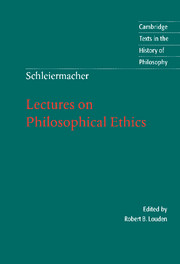Book contents
- Frontmatter
- Contents
- Introduction
- Chronology
- Further reading
- Note on the text
- Translator's note
- Lectures on Philosophical Ethics
- Ethics 1812/13: Introduction and doctrine of goods
- Ethics 1812/13: Doctrine of virtue and doctrine of duties
- Introduction, final version (probably 1816/17)
- Doctrine of goods, final version (probably 1816/17)
- Doctrine of duties, final version (probably 1814/17)
- Index
Introduction, final version (probably 1816/17)
Published online by Cambridge University Press: 05 June 2012
- Frontmatter
- Contents
- Introduction
- Chronology
- Further reading
- Note on the text
- Translator's note
- Lectures on Philosophical Ethics
- Ethics 1812/13: Introduction and doctrine of goods
- Ethics 1812/13: Doctrine of virtue and doctrine of duties
- Introduction, final version (probably 1816/17)
- Doctrine of goods, final version (probably 1816/17)
- Doctrine of duties, final version (probably 1814/17)
- Index
Summary
This would have to be printed in advance, as a sample, but then the rest should follow in its entirety.
Conditions for the depiction of a particular science
If any one especial science is to be perfectly depicted, it cannot begin purely on its own but must be related to a higher knowledge, and finally to the highest knowledge, from which all individual knowledge must proceed.
For any especial science there are necessarily others which are coordinated with it. If each is the development of a particular intuition, then either they belong together as parts of a greater way of thinking which alone allows us to understand the way in which they belong together, and so on as far as a highest intuition which encompasses everything and which would then be the object of the highest science; or else they belong apart from one another, but even then each is only a perfect science when there is an accompanying knowledge of this relationship, cognition of which would then be the highest form of knowledge.
If each especial science is a whole composed of logical deductions following from a particular point, then either that point is a subordinate one, itself found by a process of deduction, up as far as a highest point which is both necessarily and originally posited, together with the way of arriving at it, by the highest knowledge, without which even that science is imperfect; or else the starting-points for all the especial sciences are originally posited, each one separately, and then they are all only perfect sciences if the relationship between their beginnings is known to each one of them, so that this would then be the highest form of knowledge.
- Type
- Chapter
- Information
- Schleiermacher: Lectures on Philosophical Ethics , pp. 135 - 167Publisher: Cambridge University PressPrint publication year: 2002



